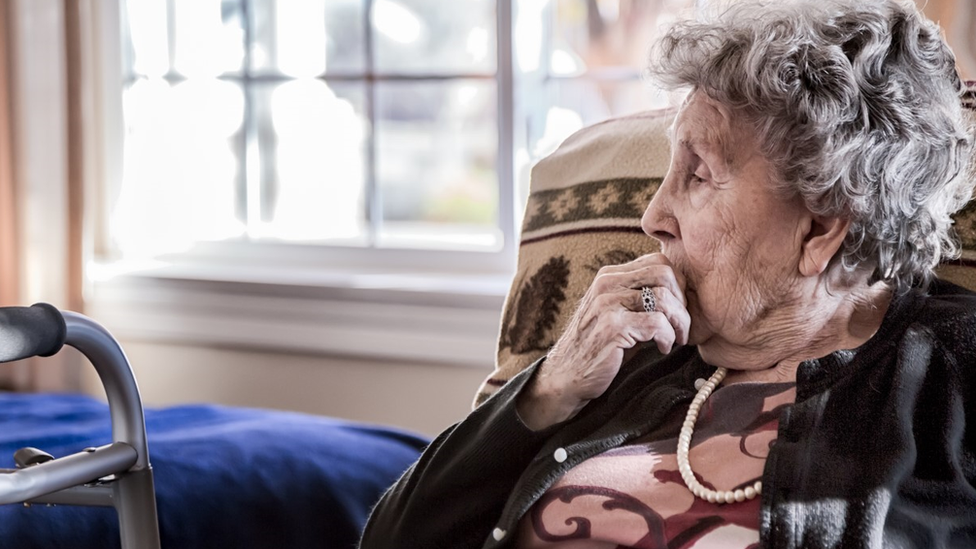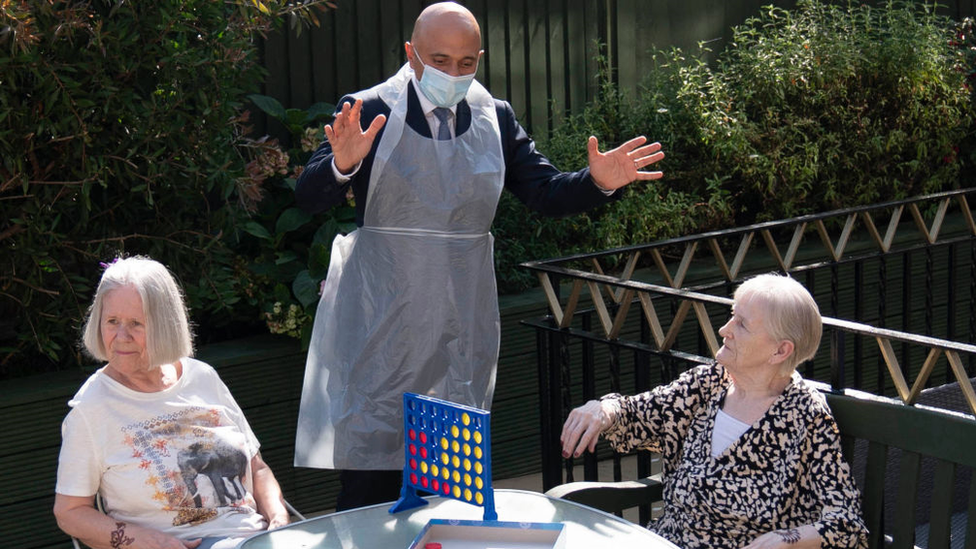Social care: Will people still have to sell their homes?
- Published

Prime Minister Boris Johnson has announced a plan to cap the cost of social care in England.
It comes almost two years after the Conservative Party's manifesto promise on social care: "Nobody needing care should be forced to sell their home to pay for it."
So will the creation of an £86,000 care cap fulfil this commitment?
What are the existing social care costs and how are they changing?
The social care system mainly helps older people and people with high care needs with tasks such as washing, dressing, eating and taking medication.
To have residential care paid for by their local council, people in England must have savings and assets - which may include their home - worth less than £23,250.
Below that level, the amount they pay reduces until you have less than £14,250, at which point the council pays for your care if you qualify. However, you may still need to contribute some of your income, external, such as your pension.
The government says this current system means one in seven people in England ends up paying £100,000 or more.
And those with long-term needs - such as dementia - may have to sell their home to pay for residential care costs.
The introduction of a cap would give people the confidence to properly plan their assets, "because they know the maximum cost they will face in their lifetime will be £86,000", Health Secretary Sajid Javid said.
As well as your home, assets can also include things like cars, investments and savings.
But when asked whether some people would still have to sell their homes - given the cap does not include costs such as accommodation and food - Mr Javid told BBC News: "We will make sure that everyone is able to access what is called the deferred-payment agreement... which means no-one will have to sell their house in their lifetime."
What are deferred-payment agreements?
Deferred-payment agreements (DPAs) were introduced by the then government in 2015.
A DPA is a legal arrangement with a local council. It covers care costs up front and secures these against a person's home at a fixed-interest rate.
When the person dies, their home is sold to repay the loan - but they will not have to sell it before then to pay for residential care.
As well as interest, administration costs may also apply.
And councils can refuse to approve these loans, if, for example, they do not think they will get all of their money back.
In the year ending March 2020:
3,415 new DPAs were agreed, at a total value of £53.2m, external
a further 690 requests were turned down by councils in England
To put this into context, we asked the government how many people had been forced to sell their homes to pay for social care but it has not provided the figures.
Since the care cap was announced, the government has said it is keen to extend the use of DPAs, to provide more flexibility for people to defer their care payments.
But it has yet to say how it will do this.
As well as DPAs, the government expects more financial products, such as insurance, will be available for future care needs, because the cap provides more certainty about the costs faced.

"No-one will have to sell their house in their lifetime," Mr Javid says
What about the manifesto commitment?
Boris Johnson's health and social care plan breaks two pledges from the 2019 Conservative manifesto - not to raise the rate of National Insurance and to keep the "triple lock formula" for annual state pension increases.
Referring to the manifesto promise "nobody needing care should be forced to sell their home to pay for it", Labour leader Sir Keir Starmer asked Mr Johnson, at Prime Minister's Questions, if he "still stands by his guarantee".
The prime minister did not confirm this.
Sir Keir then asked how someone with assets of £186,000 (including the value of their home), for example, could pay care costs of £86,000 without selling their home.
Mr Johnson did not answer directly but said his plan would deal with "the catastrophic costs faced by millions of people".
Resolution Foundation think tank chief executive Torsten Bell says: "Somebody who has significant residential-care costs and does not have lots of financial assets will still - in most cases - have to put a charge on the home.
"They will not have to sell it while they are alive - but when they pass away, the council will have had a charge on that home".
Since the announcement of the £86,000 cap, which starts in October 2023, some of the language has shifted compared with what was written in the manifesto.
Mr Javid has promised, for example, to extend DPAs so "no-one will have to sell their house in their lifetime".
